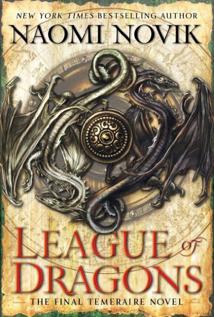
And so it ends. Not with a bang, nor with a whimper, but with a roar. Mostly.
On one hand, we get the end of Napolean and the wars that have engulfed Europe and a good chunk of the world. Dragons from all over, thousands of them, fighting in the air and on the ground. It’s pretty epic and what I had hoped the series would be.
On the other hand, we don’t actually get a number of those big moments. There is plenty of dragon conflict, don’t get me wrong, but there’s also a lot missing. Lien. There’s an ending, but how did we get there? No big speeches, no dragon generals squaring off, no big final battle. Just fait accompli. Fin.
On other other other hand, emancipation is on for the dragons. It’s kind of fascinating how much they’ve been looked on when you can clearly see how well some of them think compared to your average human… but this is also an era of slavery, so I suppose it’s to be expected. A conclusion, or at least the start of one, in both cases, but again, there could have been more.
On the other … you get the idea … hand, Temeraire and Laurence. Oh I do enjoy the two of them together.
“I have been speaking with Dyhern a great deal on the subject of dueling," Temeraire said, “and it seems plain to me that something must be done. You must give me your word, Laurence, that if anyone ever should insult you again, they must be told at once that I will insist on being your second myself. I am very much indebted to Mr. Hammond for having killed that wretched fellow, but in future, if anyone likes to prove they are not a coward by insulting you, they may fight me, and then they cannot complain of not having had satisfaction: I am sure everyone will agree they were brave, once they are dead.”
And finally:
“And if you have been lying about it,” Iskierka put in, having roused enough from her napping to follow the conversation, with slitted eyes, “you may be quite sure you will all be sorry: if anything has happened to my egg, I will burn everything between here and whatever house Napoleon is hiding in, and then I will set that on fire, too.”
Given the–shall we say rather forceful–personalities of her forebearers, it’s no wonder Ning has quite the attitude. Well done enough.
Overall, an enjoyable ending to an enjoyable series. The first half is by far the stronger, but I’m glad to have finished it. I do really enjoy Novik’s work and need to seek out any left! Onward!